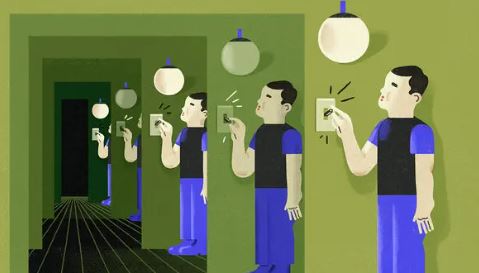I’ve had the privilege of working with many patients, each with their own unique health challenges. One condition that I often encounter, and which is widely misunderstood, is Obsessive-Compulsive Disorder, commonly referred to as OCD. Most people have heard of OCD, but there’s a lot of misinformation out there. Some think it’s just about being neat and organized, but it’s so much more than that.
At its core, OCD can make individuals believe things that aren’t true, causing distress and affecting their daily lives. In this post, I’ll dive into the intricacies of OCD, shedding light on how it can distort reality, and sharing insights from my own experiences in the medical field. Whether you’re someone who struggles with OCD, knows someone who does, or is just curious about the condition, I hope this post offers a clearer understanding.
What are Obsessions and Compulsions?
From my time in the ward and interacting with patients, I’ve come to realize that there’s a bit of confusion about what exactly constitutes obsessions and compulsions. Let’s break it down:
Obsessions: These are unwanted, intrusive thoughts, images, or urges that pop into a person’s mind, causing significant anxiety or distress. Imagine having a song stuck in your head, but instead of a catchy tune, it’s a distressing thought that you can’t shake off. For instance, a person might constantly worry about germs on their hands, even if they’ve just washed them.
Compulsions: In response to these obsessions, individuals feel an urge to perform certain behaviors or mental acts to reduce the distress. Using our earlier example, the individual worried about germs might wash their hands repeatedly, even if they’re already clean. It’s their way of trying to find relief from the anxiety caused by the obsessive thought.
It’s essential to understand that these compulsions, although they offer temporary relief, aren’t always connected in a realistic way to the obsessions. As a nurse, I’ve seen patients who check their oven multiple times to ensure it’s off, even if they haven’t cooked that day. It’s not about the oven; it’s about the relief from the anxiety.
Ways OCD Can make you believe things that aren’t true
Working closely with patients has given me a front-row seat to the ways OCD can twist one’s perception of reality. Here are some common distortions I’ve observed:
Intrusive Thoughts: As I mentioned earlier, these are unwanted and distressing thoughts that can be so convincing that the individual starts to believe them. For example, a mother might have a fleeting thought of harming her child, even if she would never act on it. These thoughts can be terrifying and make the person feel guilty or ashamed.
Overestimation of Danger: I’ve seen patients who genuinely believe that if they don’t perform a specific ritual, something terrible will happen. They might fear that if they don’t tap a door handle three times, their loved one will have an accident. This fear is not based on reality, but to the person with OCD, it feels very real.
Need for Certainty: Many of my patients express a constant need for reassurance. They doubt their actions and memories, leading them to perform compulsions. A classic example is someone who goes back multiple times to check if they locked their door, even if they remember doing so.
Magical Thinking: This distortion is fascinating. Some patients believe that unrelated actions can influence outcomes. Like thinking, that if they wear a particular shirt, their day will go well. Or if they avoid certain numbers, they can prevent bad luck.
Responsibility: Feeling an exaggerated sense of duty is common. A patient might think that if they don’t pray in a specific way, they’re causing harm to others. This inflated sense of responsibility can be emotionally draining.
Moral Scrupulosity: This one is close to my heart, as I’ve comforted many patients distressed over minor moral dilemmas. They might ruminate over a small lie they told years ago or worry excessively about offending someone unintentionally.
The Internal Conflict
One of the most heart-wrenching aspects I’ve witnessed in patients with OCD is the internal battle they face daily; The invisible struggle that takes a toll on their mental well-being. Let me paint a picture for you:
- Rational vs. Irrational: Deep down, many individuals with OCD recognize that their fears and compulsions might not be grounded in reality. They might know that checking the stove ten times is excessive or that their hands are clean after a standard wash. But another part of them, the OCD part, convinces them that they must act on their compulsions to prevent imagined catastrophes.
- Emotional Toll: This tug-of-war between what they know and what they feel compelled to believe can be emotionally exhausting. Imagine constantly second-guessing yourself, feeling trapped in a loop of distressing thoughts and rituals. It’s like having two voices in your head: one that’s trying to reason and another that’s sowing doubt and fear.
- Impact on Daily Life: The time and energy spent on rituals can significantly disrupt daily activities. I’ve had patients who were late to work because they spent hours checking and rechecking things at home. Others avoid social situations for fear of triggering their obsessions.
Treatment Options
I’ve also been fortunate to witness the transformative power of effective treatments for OCD. While the journey can be challenging, there’s hope. Let’s look into some treatment avenues that have proven beneficial for many:
- Cognitive-behavioral therapy (CBT): This is a type of talk therapy that helps individuals recognize and change negative patterns of thought and behavior. In my experience, it’s one of the most effective treatments for OCD. Through CBT, patients learn to confront their fears and reduce compulsive behaviors.
- Exposure and Response Prevention (ERP): A subtype of CBT, ERP involves exposing individuals to the thoughts, images, and situations that make them anxious and prevent them from performing their usual compulsive behaviors. Over time, this exposure helps reduce the intensity of their obsessions and compulsions.
- Medication: Certain antidepressants can be effective in treating OCD. As a nurse, I’ve seen patients benefit from medications, especially when combined with therapy. It’s crucial to consult with a psychiatrist or primary care provider to discuss potential risks and benefits.
- Support Groups: Sharing experiences and coping techniques with others facing similar challenges can be therapeutic. I’ve often recommended support groups to patients as a supplementary resource.
- Lifestyle Changes: Regular exercise, a balanced diet, adequate sleep, and stress management techniques can help manage OCD symptoms. It’s remarkable how holistic well-being can impact mental health.
As someone who’s been on the frontlines of patient care, I can’t stress enough the importance of early intervention and the potential for improvement with the right support.
Conclusion
Returning to our initial question: Can OCD make you believe things that aren’t true? The answer, as we’ve explored, is a resounding yes. But it’s essential to understand that it’s not a simple matter of mere belief. It’s a manifestation of a complex mental health condition, characterized by distressing obsessions and compulsive behaviors.
As a nurse, I’ve witnessed the struggle, resilience, and hope of individuals with OCD. While they might grapple with beliefs and perceptions that aren’t grounded in reality, with the right support and treatment, they can find relief and lead fulfilling lives.
Understanding OCD is more than just knowing its symptoms; it’s about empathizing with the internal battles individuals face daily. So, the next time someone asks, “Can OCD make you believe things that aren’t true?” Yes




